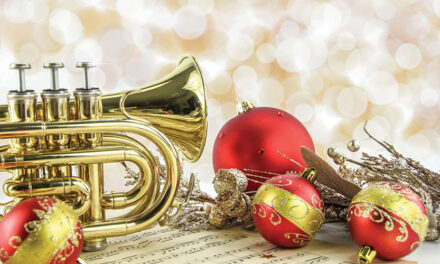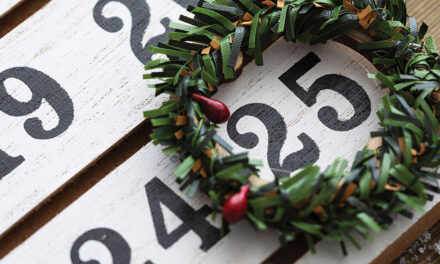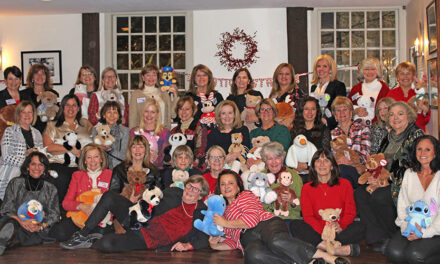
By GAIL LOWE
Note: Gail Lowe, a reporter and columnist for our family of community newspapers, wrote a holiday story each year. This is her last one, written in the days before she passed away on December 7.
Before Elise Auclair sets out for the shores of Lake Quannapowitt on this late Sunday afternoon, she listens to “The Skaters Waltz” by French composer Emile Waldteufel.
Many people think that Johann Strauss wrote the piece, but they are wrong. This one belongs to Emile.
When he wrote the music, the composer might have imagined a cold winter day. Perhaps he was living in an apartment in Paris that overlooked the Seine and, in his mind’s eye, he envisioned skaters testing the ice at the river’s edge before venturing out farther.
Emile may have closed his eyes and listened to the composer within. Could he have heard a solo horn to open the piece followed by graceful notes played by strings and woodwinds that suggested the rise and fall of the wind and swirling snow? Did he hear the tempo change until settling into three-quarter time? And once again, did the horn come to the fore? And what about the percussion? Ah, yes, Elise imagines that Emile likely heard sleigh bells.
The music soothes Elise; it is her favorite classical work and there is a reason for this. Her imagination goes into high gear when she hears “The Skaters Waltz” because she was born and raised in Paris and lived in an apartment right on the Seine. If not for meeting Martin Auclair during World War II, she would not have come to America. He had been serving in the U.S. Air Force, and after meeting at Moulin Rouge, they fell in love. He eventually asked for her hand in marriage, and she said yes.
A widow now, Elise’s daughter Francine is a skater and a champion skater at that, headed to the Olympic Games in February, according to Elise.
On her way to the Lake, images of Francine bounce to the surface of Elise’s mind. She can see her daughter with clarity, beginning with the costume she is wearing. Talented with a needle and thread, Elise told people she knew that she had made the two-piece outfit only a few weeks ago. She had chosen satin in a shimmering sapphire color for the top layer of the skirt and had lined it with fluffy white chiffon. Above the skirt is a peplum jacket trimmed in white faux fur with little pompoms for buttons and a muff to keep her hands warm when she is off the ice. Elise had woven thin silver ribbon into the faux fur to dazzle the eye. When Francine spins, twirls and jumps in the air, the effect is breathtakingly beautiful.
Elise always makes sure that the blades of Francine’s skates are razor sharp, all the better to assist her in the execution of triple axels, camel spins and Lutz jumps. No matter what move is required of her, she handles each one with expert precision.
Yes, Elise thinks Francine will come away with the gold medal this year, and if not the gold, then certainly she will take the silver.
A new generation of skaters perfecting their skills are already on the ice this afternoon. Francine will soon arrive to cheer them on, and then the others will depart so she can have the ice to herself.
As Elise waits on the Lower Common, she thinks about her career as a skating instructor. It had been a good choice for her, a career she had loved for over forty years. She was beside herself with joy when Francine began to show her own talent for skating when she was just five years old. As she grew older, her talent for the ice took off like a rocket into outer space.
It is now four-thirty in the afternoon, and twilight is already darkening the sky. The air is growing colder, so Elise reaches into her pocket for her scarf but finds that it is not there. To make up for the missing scarf, she warms herself by standing up the collar of her woolen coat. Any time now, Francine will call out to let her mother know she has arrived. Elise has with her a small portable CD player. When the time comes, she will press the START button and play her favorite waltz—“The Skaters Waltz.” Maybe Francine will surprise her mother by skating toward her from the cove on the Main Street side of the Lake. Maybe she will then make her grand entrance.
Elise’s hands are cold now, so cold she can barely bend her fingers. Best to put on the cashmere-lined gloves Francine gave her two Christmases ago. She reaches into her right pocket, but like the scarf, they are not there. What? She forgot her gloves, too? It is now five o’clock. Where is Francine? She is never late like this. Elise hopes her daughter has not met with some kind of catastrophe like a car accident, God forbid.
The east wind has picked up again, and with it comes a swirl of giant snowflakes. They are landing on Elise’s shoulders, her eyelashes and cheeks. Her ski hat is in her tote bag—or is it? No. It is not there. How could she have forgotten her scarf, gloves and her hat, too? Why has she become so forgetful? And never before has she had to wait so long in the cold for Francine. Where in the world is she?
Wait! Elise hears a grinding sound . . . skate blades gliding over ice! She shades her eyes and scans the Lake to see where the sound is coming from. No one is there, but surely she heard the blades of Francine’s skates. There is no other sound in the world like it. Maybe if she hits the START button on the recorder Francine will appear. She presses the button. At the beginning of the piece, she hears the solo horn. Does Francine hear it, too? Elise calls out her daughter’s name. “Francine! Francine!”
But there is only silence; the grinding sound has faded away. Francine must be out there, teasing her. She has never done that before, but there’s always a first time. Oh, how she enjoys her daughter, her Francine.
Elise squints, trying her best to find Francine in the waning light. Is that her over by the willow tree? Elise sees something white and fluffy. Her jacket? No. It is a fat white rabbit scampering to its warren.
She calls out to her again, “Francine! Francine! I’m over here. Show me what you’ve learned this week. Show me what you can do!”
Elise is sure she can hear Francine answer her. Did she not just hear her call out?
She uses her eyes to sweep the entire expanse of the Lake. A moment later she hears that grinding sound again and then sees a figure rise from the ice and spin like a top. Francine! It must be her. She is performing as she has never performed before. But then . . . but then . . . Elise hangs her head in sorrow. What she had thought was Francine was nothing more than a gust of wind that had raised a swirl of snow.
She hears someone call to her—“There you are!”
She turns. The woman approaching seems familiar to her, but she’s not sure who she is.
“Francine is not on the ice,” the woman says kindly. “Not today.”
“But Francine always comes here to practice,” Elise says. “I want to see what she has learned this week.”
“She had something else to do today. She isn’t coming. Now, let’s get you warmed up.”
“But Francine is here. I heard the grinding of her blades.”
“Come along, now. Supper’s waiting.”
“No. Francine will think I abandoned her. Please . . . let me stay a few more minutes.”
The woman looks at Elise, sees the sorrow in her eyes.
“All right. Fifteen minutes. I will wait in my car. Here. Take my gloves to keep your hands warm.”
The woman touches Elise’s cheek affectionately before leaving.
Elise slides her hands into the gloves, moves to the edge of the Lake and walks along the shore, certain she will see Francine skate past her at any moment.
She presses the START button on her recorder and again hears that solo horn.
“Come on, Francine. Show Maman your best moves!” she shouts into the wind.
When fifteen minutes pass, she feels the woman’s hand at her elbow. “When I see Francine, I will tell her you came to watch her skate,” she says.
Elise raises her eyes to the sky and watches as the stars light up, one by one.
“It’s getting cold. I don’t want you to be late for supper,” says the woman.
“Yes, that’s right. And I forgot my scarf. And my hat. I’m cold.”
“I’m sure you are. Why don’t you come with me now. When I see Francine, I’ll tell her you were looking for her.”
“And that I will be back to see her tomorrow afternoon?”
“Yes, that, too.”
Elise and the woman turn and walk toward the parking lot near the big stone church. A couple who live in the neighborhood walk past them and nod a hello.
The couple know that Elise goes to the shores of the Lake every afternoon in winter. They know she waits to see her Francine on the ice. But they also know something else. When Francine was fourteen years old, she and Elise went on the ice together. Elise encouraged Francine to perform a difficult spin and just as she went into the spin, the blade of her right skate struck a small stone and she fell hard, breaking a bone in her right arm. When Elise skated to where her daughter lay in a heap, she was so upset that she didn’t see the small twig in her path. The blade of her skate hit the twig, and Elise fell, too, striking the side of her head. The fall damaged the temporal lobe of her brain, and from that day on she has had trouble with her memory.
Elise is nearing eighty now, and Martin died long ago. There is no one left to talk to about Francine except for the woman beside her. Together, they walk across the grass on the Lower Common. But before they reach the parking lot, Elise turns one final time and listens hard. Yes, she is sure she can hear that grinding sound, a sound that can only be made by the blades of Francine’s skates.
“Come, now. Supper is waiting.”
The two walk toward the woman’s car, and she takes Elise to the senior housing facility where she now lives.
Elise can’t recall the name of the woman beside her and wonders whether she should ask, but that would be rude, wouldn’t it? No. It’s better that she not ask. She smiles at her as they walk toward the front door, and when it opens they hear music. Someone is playing “The Skaters Waltz” on piano.
“Oh, my favorite!” says Elise. “Thank you for bringing me home. Here are your gloves.”
“Thank you, and you’re welcome. I will see you soon.”
“Tomorrow?”
“Yes, tomorrow. And if I see Francine, I will let her know you want to see her on the ice.”
“Thank you,” replies Elise. “That would be so kind of you.”
The woman watches as Elise passes the reception desk and disappears around the corner. Then she sees a man coming toward her.
“Hello, Francine,” the man says. “Did you have a nice visit with your mother?”
“Yes, but she has no idea who I am.”
“Why don’t you surprise her for Christmas and put on a little show at the Lake. She would love that. She’s always telling me what a great skater you are.”
Francine smiles. “I probably was when I was younger, but not now. I’m too old to risk another broken bone. Then again, getting back on the ice is similar to getting back on a bicycle. The memory of ‘how’ comes to you naturally. So, maybe I will bring out my skates. And I know that the costume my mother made for me still fits.”
The man nods, says he thinks it would be a perfect Christmas gift for her mother.
“Have a lovely holiday,” she says before leaving.
“I will. I hope you do, too.”
Yes, Francine will have a lovely holiday. She will spend it with her husband and wait for a phone call from their son on Christmas Eve. He lives in Colorado now and doesn’t come home often, but he is faithful with his calls.
On Christmas morning, she will take herself to the Lake to practice those difficult skating moves her mother had taught her so long ago. Then, in the afternoon, she will visit her mother and show her pictures of herself when she was young. Elise will enjoy seeing them. And so will Francine. She will also bring her skates and the pretty costume her mother hand sewed so many years ago. She has kept her youthful figure, thanks to her vigorous exercise program, and the costume still fits. Then, she will invite her mother to the Lake. They will go in the late afternoon, and she will perform to “The Skaters Waltz.”
Her performance will be the perfect Christmas gift, the one Francine hopes her mother might never forget.





